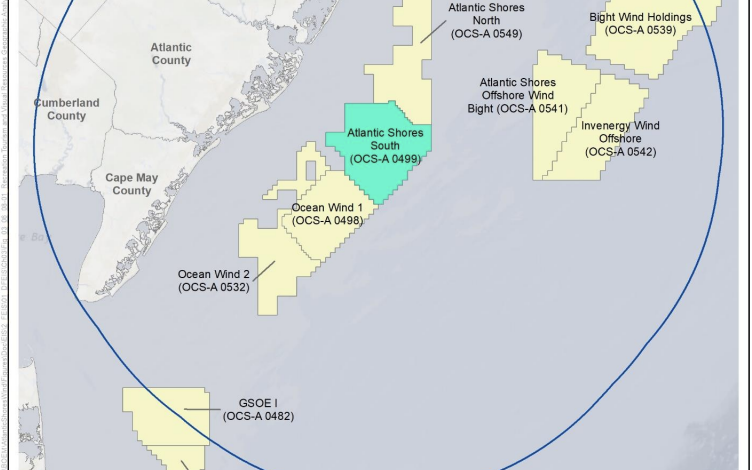New Jersey has abandoned plans for a fourth offshore wind solicitation, effectively killing the proposed Atlantic Shores project after Shell withdrew as an equity partner.
The decision by state utility planners shatters Gov. Phil Murphy’s long-running ambitions to shift the state’s power production to wind power and other renewables.
For now, it’s a victory for New Jersey commercial fishermen. The fishing industry’s cautious approach years ago – even supporting a small pilot project called Fishermen’s Energy, for five wind turbines off the beach at Atlantic City – soured as the federal and Northeast state governments escalated proposals for much bigger turbine arrays near fishing grounds.
Atlantic Shores would have been the remaining flagship project, after Ørsted abruptly cancelled its Ocean Wind plan in late 2023 amid soaring costs.
Both projects fanned opposition from the fishing industry. The East Coast surf clam and ocean quahog fleets were established decades ago at New Jersey ports like Point Pleasant and Atlantic City. For sea scallops, Cape May at the state’s southern tip, and Barnegat Light on Long Beach Island, are second only to New Bedford as profit centers for the fishery.
Shell’s withdrawal from the joint venture with EDF had left open whether another partner could be found. Atlantic Shores Offshore Wind LLC sought to continue with price adjustments to contend with the industry’s inflation and supply chain issues.
“The board will not proceed with an award in New Jersey's fourth offshore wind solicitation,” Christine Guhl-Sadovy, president of the state Board of Public Utilities announced Monday. “There were three initial bidders in the fourth solicitation. However, two bidders withdrew and only Atlantic Shores submitted a best and final offer.”
BPU president Guhl-Sadovy said a new wind solicitation, “despite the manifold benefits the industry offers to the state, would not be a responsible decision at this time…the Board is committed to working with Governor Murphy and our sister state agencies to build a successful offshore wind industry in New Jersey.”
In a statement Governor Murphy insisted “developing the offshore wind industry in New Jersey is a once-in-a-generation opportunity to create tens of thousands of jobs, drive an entirely new manufacturing supply chain, and secure energy independence. This is especially critical during a time when new energy generation is needed to provide our residents and business with reliable, cost-effective energy solutions.”
“However, the offshore wind industry is currently facing significant challenges, and now is the time for patience and prudence. I support the BPU’s decision on the fourth offshore wind solicitation, and I hope the Trump Administration will partner with New Jersey to lower costs for consumers, promote energy security, and create good-paying construction and manufacturing jobs.”
After President Donald Trump’s Inauguration Day executive order for a six-month moratorium on offshore wind permitting, the end of New Jersey’s renewable drive is another setback for advocates.
‘It is clear that today’s decision at the state-level was a direct result of the corporate greed of Shell backing out as an equity partner, the fossil fuel industry at large, and a Federal administration that prioritizes profit margins and lining their pockets rather than the health of the American people and our environment.,” said Anjuli Ramos-Busot, director of the New Jersey Sierra Club.
For offshore wind power opponents like the Save Long Beach Island activist group, their celebrations are tempered by the possibility that projects might be revived under a future presidential administration.
According to. Stern, next steps for opponents can include revoking investment tax credits and other incentives in the Inflation Reduction Act, cancelling federal lease areas and seeking to overturn prior project approvals.
Meanwhile wind industry advocates hold out hope that pro-development momentum can be maintained in some states.
“Despite today’s news, it remains true that offshore wind is creating jobs across the country, strengthening the American economy through a 40-state supply chain, and delivering reliable power to our grid,” said Liz Burdock, president of the Oceantic Network. “That supply chain has seen over $25 billion in investment, over 64% of which has gone to Republican districts.”







